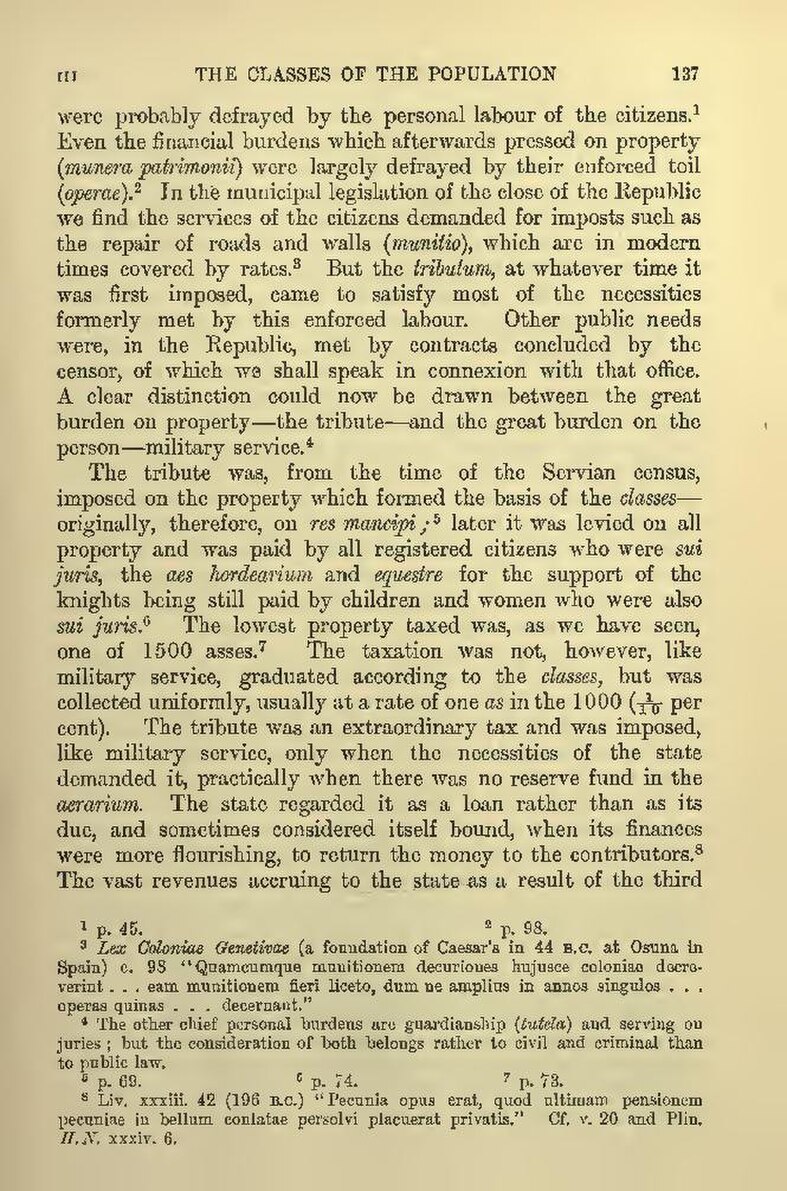were probably defrayed by the personal labour of the citizens.[1] Even the financial burdens which afterwards pressed on property (munera patrimonii) were largely defrayed by their enforced toil (operae).[2] In the municipal legislation of the close of the Republic we find the services of the citizens demanded for imposts such as the repair of roads and walls (munitio), which are in modern times covered by rates.[3] But the tributum, at whatever time it was first imposed, came to satisfy most of the necessities formerly met by this enforced labour. Other public needs were, in the Republic, met by contracts concluded by the censor, of which we shall speak in connexion with that office. A clear distinction could now be drawn between the great burden on property—the tribute—and the great burden on the person—military service.[4]
The tribute was, from the time of the Servian census, imposed on the property which formed the basis of the classes—originally, therefore, on res mancipi;[5] later it was levied on all property and was paid by all registered citizens who were sui juris, the aes hordearium and equestre for the support of the knights being still paid by children and women who were also sui juris.[6] The lowest property taxed was, as we have seen, one of 1500 asses.[7] The taxation was not, however, like military service, graduated according to the classes, but was collected uniformly, usually at a rate of one as in the 1000 (1/10 per cent). The tribute was an extraordinary tax and was imposed, like military service, only when the necessities of the state demanded it, practically when there was no reserve fund in the aerarium. The state regarded it as a loan rather than as its due, and sometimes considered itself bound, when its finances were more flourishing, to return the money to the contributors.[8] The vast revenues accruing to the state as a result of the third
- ↑ p. 45.
- ↑ p. 98.
- ↑ Lex Coloniae Genetivae (a foundation of Caesar's in 44 B.C. at Osuna in Spain) c. 98 "Quamcumque munitionem decuriones hujusce coloniae decreverint . . . eam munitionem fieri liceto, dum ne amplius in annos singulos . . . operas quinas . . . decernant."
- ↑ The other chief personal burdens are guardianship (tutela) and serving on juries; but the consideration of both belongs rather to civil and criminal than to public law.
- ↑ p. 69.
- ↑ p. 74.
- ↑ p. 73.
- ↑ Liv. xxxiii. 42 (196 B.C.) "Pecunia opus erat, quod ultimam pensionem pecuniae in bellum conlatae persolvi placuerat privatis." Cf. v. 20 and Plin. H.N. xxxiv. 6.
